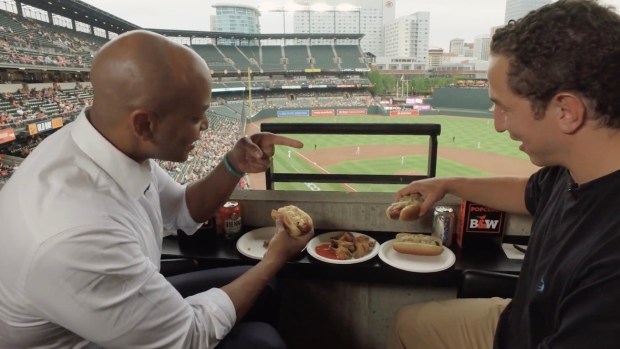An arbitrator awarded more than $250,000 to a former Baltimore “Hooters Girl” this week, finding that her firing constituted racial discrimination — an allegation the restaurant chain vigorously denies.
Farryn Johnson says that managers at the restaurant’s Inner Harbor location objected to her having blonde highlights.
Johnson, who is African-American, says a manager told her the highlights were not permissible because “black people don’t have blonde hair,” according to the arbitrator’s report. She contends that other waitresses of other races were not disciplined for having hair colors that were not natural. She was fired in August 2013, the ruling says, because her supervisor said she violated the chain’s “image policy.”
Arbitrator Edmund D. Cooke Jr. wrote that Hooters had violated both federal and state civil rights laws by disciplining, and ultimately firing, Johnson over her highlights.
The hair-color policy “was implemented in a discriminatory manner adversely affecting African-American women,” wrote Cooke, who reviewed the case for the American Arbitration Association.
Hooters slammed the ruling in a statement, claiming that the arbitrator did not listen to the restaurant chain’s side of the case. It said that Johnson’s claim that African-American women were barred from having hair in unnatural colors was untrue.
“Ms. Johnson’s claims of discrimination are simply without merit and Hooters received an adverse and flawed decision from the Arbitrator presiding over the case,” the chain wrote.
“As a former Hooters Girl who happens to be African-American, I, like countless other African-American Hooters Girls today, regularly wore my hair in various shades of blond, or any other color consistent with our ‘girl next door’ image,” Ericka Whitaker, senior brand manager for Hooters of America, said in the statement.
Jessica P. Weber, an attorney for Johnson, said the arbitrator’s “well-reasoned decision speaks for itself.”
The restaurant chain also alleged that $244,000 of the settlement would go to Johnson’s attorneys while less than $12,000 would go to the Johnson.
Weber, an attorney with the Baltimore firm of Brown, Goldstein & Levy, denied those figures, but declined to disclose the precise amount that would be awarded to her client.
Johnson, 27, said in an interview Thursday that she was now working as a leasing consultant.
She said she wished Hooter’s would apologize to her — and remove what she called the ambiguities in its policy on appearance.
Working at Hooter’s “was fun at first, until I put the highlights in my hair,” she said. “Then everything changed.”



